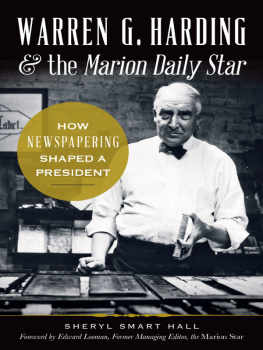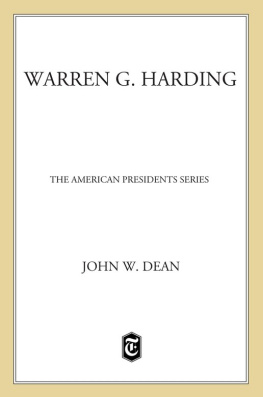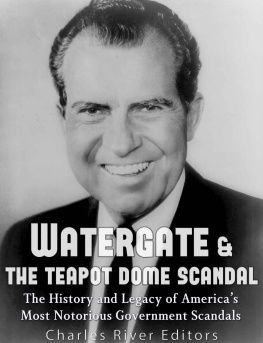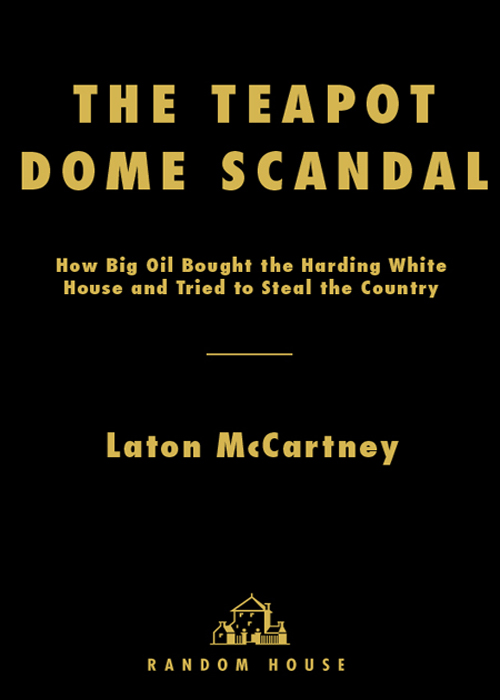
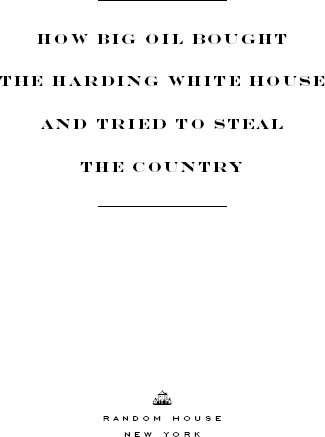

CONTENTS
FOR RY RYAN
AUTHORS NOTE
I n the interest of full disclosure, I should mention that my family benefited from some of the ill-gotten gains accumulated from the Teapot Dome affair. In 1935, my father, Frederick Laton McCartney, then going into his senior year at Yale, spent the summer in Europe.
By the time he got to Paris in late August, my father was flat broke. Desperate, he called the only person he knew in the city, Harry M. Blackmer, one of the chief participants in the oil swindle, and asked for a loan, explaining that he was Fred McCartneys son. At the time, Blackmer was living in exile in Paris with a $10 million Teapot windfall and his mistress and later second wife, a Norwegian opera singer named Eide Norena. A former resident of Denver, Blackmer had often played golf with my grandfather, but as a wanted man, he was leery that my father might be an FBI agent or a journalist. If youre Fred McCartneys son, he asked, how would your father play the thirteenth hole at the Denver Country Club?
My grandfather was a champion amateur golfer and the designer of the golf course in question. He was also left-handed, which meant that his game, and in particular his strategy in playing the thirteenth hole, differed from that of right-handed players such as Blackmer. After my father, a golfer himself, explained how Fred Sr. typically played the thirteenth, Blackmer gave him his address and asked him to come right over to his apartment. There, my father enjoyed a lavish dinner and drank champagne with the old rogue and his Norwegian ingenue while Blackmer pumped him for news from home and later presented him with $150. That was a sizable sum in 1935, more than enough to sustain my father until his ship departed a few days later.


A REVERSAL OF FORTUNE
ARDMORE, OKLAHOMA, NOVEMBER 21, 1920
T he Oil King of Oklahoma came back to the Randal Hotel and flopped down on the bed in room 28 without undressing. It was just after 6:00 p.m. Jake Hamon had been drinking most of the afternoon. He needed a nap if he was going to make supper.
Clara Hamon was in the adjoining room when Jake came in. She listened as he dropped his keys and change on the bureau and collapsed on the bed. She and Jake had been together ten years. They shared the Hamon name but were neither married nor related. A few months after they met, Jake had paid his nephew Frank Hamon $10,000 to marry Clara and then sent him off on the first train to California. The marriage had been a blind. Jake wanted Clara for himself. Sharing the Hamon name made it easier for them to travel together, registering in hotels as Jake and Clara Hamon.
Jake had left his wife and two children for Clara. A clerk in a dry goods store, Clara had been seventeen at the time, eighteen years Jakes junior. With her wavy brown hair modestly done up, her deep blue eyes, and her reluctance to wear rouge, she looked more like an attractive young schoolteacher than Jake Hamons mistress. After they met, Jake offered her a job, sent her to stenography school, and took her out to the oil fields with him when hed been wildcatting on the Osage and up on the Panhandle. Clara was smart and every bit as ambitious as Jake. For the past few years, shed been acting as his business partner and adviser. He wasa masterful man, Clara said. He dominated me from the first time I looked into his eyes and noted the strange glint in them.
Now Jake had hit the big time, the jackpot of all jackpots. Not even in his wildest dreams could he have imagined the good fortune that had recently befallen him. Until six months ago, Jake had been a big fish in a pond that was far too small to accommodate his vast ambitions. The Oil King of Oklahoma, the newspapers called him. The raucous, hard-drinking Hamon had graduated from the Law Department of the University of Kansas, then set off for Indian Territory (present-day Oklahoma), where he clerked in a store in Newkirk. When the Kiowa-Comanche country opened up to settlement, Jake went in with the first rush of new settlers to Lawton, then an Indian town. Over the next few years, he had been named Lawtons first city attorney and chairman of the Oklahoma Republican Territorial Committee; made money building a railroad with John Ringling, the circus impresario; and then got into oil, where the real money was.
With the 1920 presidential election coming up, Jake decided to gamble almost everything he had on backing a long shot in the 1920 Republican presidential convention, Senator Warren G. Harding from Ohio. Hamon borrowed nearly $1 million from the National City Bank of New York (todays Citibank), using his substantial oil holdings as collateral. He took his bankroll to Chicago and spread his money around where it counted, buying delegates and influencing the people who needed influencing. Working in tandem with Hardings campaign manager, Harry Micajah Daugherty, Hamon got Warren Harding the Republican presidential nomination.
Six months later, Warren Harding was elected president of the United States. Going into the convention, Harding had been a forty-to-one shot. Hamon agreed to back him on the condition that if he was nominatedand made it to the White HouseHarding would appoint Hamon secretary of the interior. That would give Hamon control of the Teapot Dome Naval Reserve in Wyoming, an oil supply potentially worth several hundred million dollars1920 dollarsa bonanza so rich that it was almost beyond comprehension. Of course, Jake wasnt going to pocket it all. He agreed to lease out the government fields to some of his friends in the oil business, who in turn would kick back a third of the take to Jake.
Hamon had a fortune within his grasp that could put him in the same league as old John D. Rockefeller, the richest man in America. And Jake already knew what he was going to do with a big chunk of the moneymake his son president of the United States. If Hamon and Big Oil could get an empty suit like Harding elected, putting a bright, ambitious kid like Jake Jr. in the White House would be a breeze when the time came. Of course, there was a caveat regarding the Interior post. Initially, Jake hadnt thought the matter would prove a problem, but hed been badly mistaken. When Hamon and Harding first met in New York before the convention, they discovered to their mutual amazement that their wives were relatedsecond cousins, in fact. This, of course, had given Jake a big in with Harding, but it also presented a problem. Once the Duchess, as Harding called his wife, Florence, got the low-down on Jake and Clara, she insisted that Jake get back with his wife before coming to Washington. Florence Harding wasnt going to allow her cousins husband to come to Washington accompanied by some twenty-seven-year-old floozy.
Clara had to go.
Harding spelled out the demands in a letter Jake had brought back from the Chicago convention, packed in his trunk. It stated unequivocally that Hamon had to resume his legal marital relations before he could be considered for an appointment. Not that Harding cared one way or another. He chased anything in a skirt; that was no secret. But Florence was a tough old bird. There was no getting around her.
Next page







